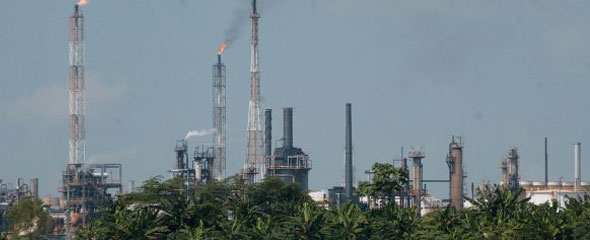
The Colombian economy has become a key political issue for the 2010 elections, which begs the question: how has the economy fared under President Uribe?
Recent economic news has been quite gloomy. The country is in its longest recession in decades. Urban unemployment rose almost a full percentage point to 12.8% between 2008 and 2009. In most major cities, joblessness is among citizens’ top complaints and is increasingly cited as a main reason for soaring urban crime rates. On the other hand, foreign investment news has remained. Colombia’s business climate continues to improve according to most international indices and foreigners are increasingly looking to do business in Colombia. Tourism continues to boom in Colombia in spite of the crisis.
These contradicting storylines have backed up both pro-Uribe and anti-Uribe arguments in the ongoing debate over the economy. To Uribistas, the disheartening employment news is a result of the global economic crisis and the difficult economic situation that the President inherited in 2002. Looking forward, the improving investment outlook seems to promise a more prosperous future for Colombia.
Government critics interpret the economic indicators quite differently. To them, foreign investment is disproportionately benefitting Colombia’s business leaders and elites while largely neglecting its poor majority. Naturally therefore, while Colombia’s business climate has dramatically improved in seven years, unemployment and poverty statistics have not.
The debate over the economy, like so many others, is mired in stagnant polarization. So, as the country moves toward an election that could result in a third term for Alvaro Uribe, it is important to examine his economic performance more closely.
Let’s begin by looking at what the President inherited in 2002. According to government study MESEP, the national poverty level was about 53% in 2002 and extreme poverty was at about 20%. The unemployment rate was an unacceptably high 15%, although by 2002 it was already in a downward trend, having reached a peak of 18% in 2000.
Uribe’s economic policies so far have been pretty orthodox. Under his leadership, Colombia encouraged investment, cut public spending, liberalized trade and complied with the appropriate debt payments. For much of his presidency, the results were very favorable: strong economic growth and low inflation. In fact, Uribe’s Colombia has been one of the fastest-growing economies in Latin America.
Of course, high growth does not always equal high employment. Uribe’s critics have gone as far as to say that economic growth under Uribe has come at the expense of unions, disadvantaged ethnic groups and Colombia’s poor in general.
So, are they right? As far as employment is concerned, Uribe’s performance has truly been mediocre. Although unemployment has definitely dropped from the 15% rate of 2002, it has never dipped below 10%, even during months of spectacular growth between 2005 and 2007. To keep things in historical perspective, the unemployment rate in 1994 was 7.2%.
Further, the “informal sector” of street vendors and recyclers continues to “employ” millions of Colombians. Other low-quality employment has even expanded. Some statistics suggest that many of the jobs created under the Uribe administration have been temporary jobs. Today, “self-employed” Colombians outnumber formal wage earners.
High unemployment contributes to poverty. According to World Bank statistics, poverty and extreme poverty have not decreased under Uribe despite high growth. Even the more favorable MESEP statistics are not encouraging. The national poverty rate in 2008 was 46%, about 8 points lower than in 2002, and the rate of extreme poverty was 18%, only 2 points lower than in 2002. This is even more embarrassing considering Uribe’s commitment to meet the UN Millennium Development Goals, which means a 28% poverty rate by 2015.
The final measure I will look at is inequality. Inequality is a hugely important in part because Colombia is notoriously unequal. In fact, many people attribute Colombia’s violent and unstable history to the persistence of socioeconomic inequality over decades. A second reason why inequality is important to this presidency is that critics of Alvaro Uribe often portray him as neglectful of the country’s poor.
So, how did the president do? Frankly, not so well. Colombia’s Gini coefficient (a common measure of inequality) did not change from 2002 to 2008. In fact, at .59, it is quite high even for Latin America, the world’s most economically stratified region. Overall, the Uribe years have transformed the Colombian economy, although perhaps not in the ways many people wanted. Colombia is increasingly integrated into the global economy in terms of trade, investment and tourism.
On the other hand, most measures of poverty, inequality and unemployment have remained frustratingly stable. After seven years of Uribe, Colombia’s social problems are no less acute.
Moving toward the 2010 election, what should Colombians make of Uribe’s economic policy? Admittedly, the last two years of his second term coincided with the worst global economic crisis in 80 years. Surely, the man is not to blame for an imported recession.
On the other hand, most of the economic statistics coming out right now were compiled in 2008, before the effects of the crisis had reached much of society. Even in 2007, an extraordinarily good year for growth, unemployment and poverty remained stable.
And yet, can we really expect Uribe to solve Colombia’s most deeply-rooted social problems? After all, economic change is slow and gradual, especially in a complicated security environment.
In my opinion, however, that is precisely what Colombians should ask of their president. For decades, we have demanded not only prosperity, but also more social equity because Colombia needs it.
For that very reason, Uribe attached himself to the largely symbolic UN Development goals. But, at the current pace, it would take much more than three Uribe terms to reach them.
The lesson is clear; Uribe’s brand of growth does not translate directly into prosperity and equality for the vast majority of Colombians. Uribista economics needs to go.

